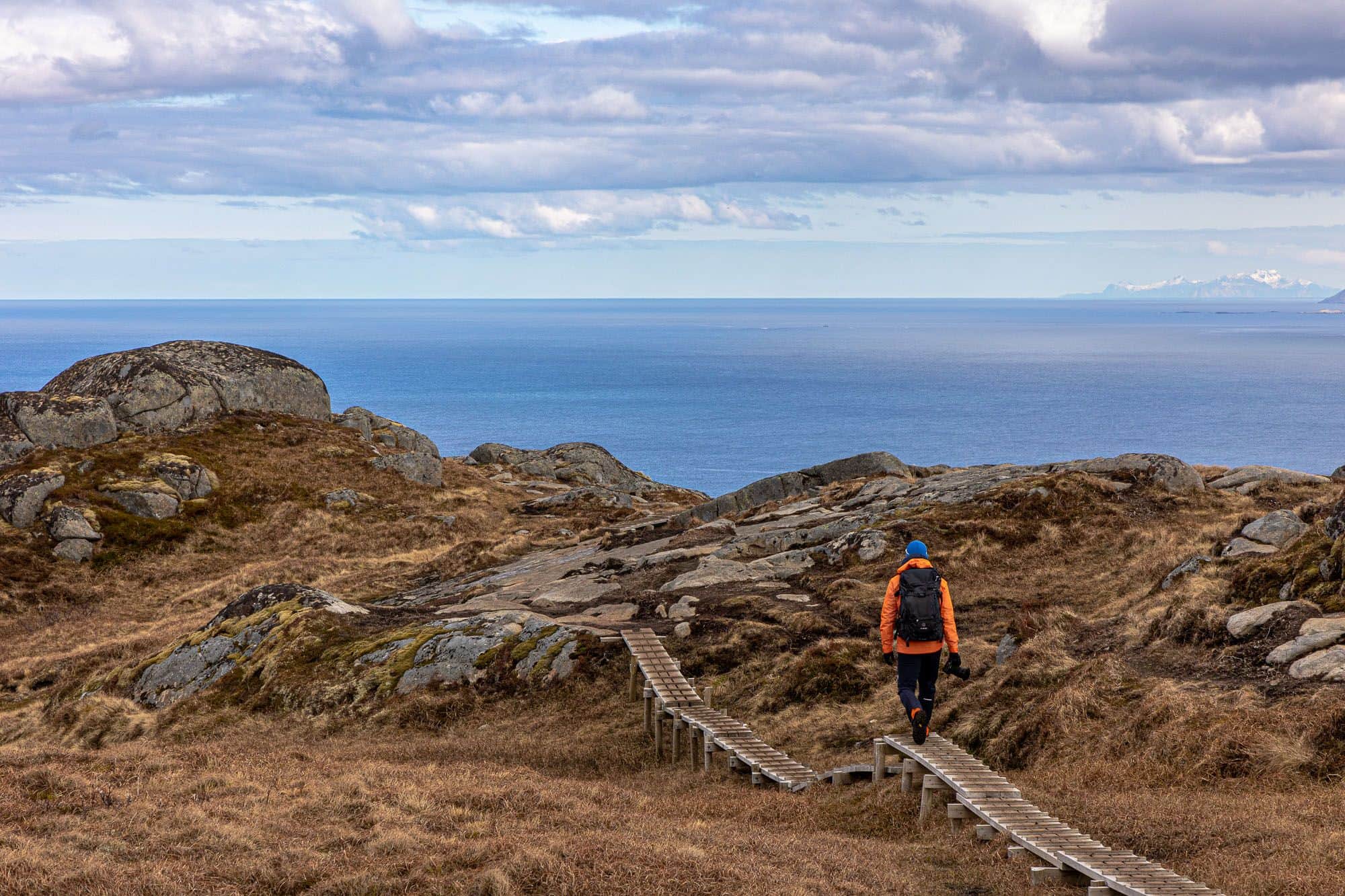Ryten is one of the most popular hiking mountains in Lofoten. Located on the west coast and in the Lofotodden National Park, this elongated peak boasts fantastic panoramic views, wonderful nature and, of course, the turn-off to the world-famous Kvalvika beach. Sounds convincing, so we packed our photo equipment and GoreTex jackets into our rucksacks and set off.
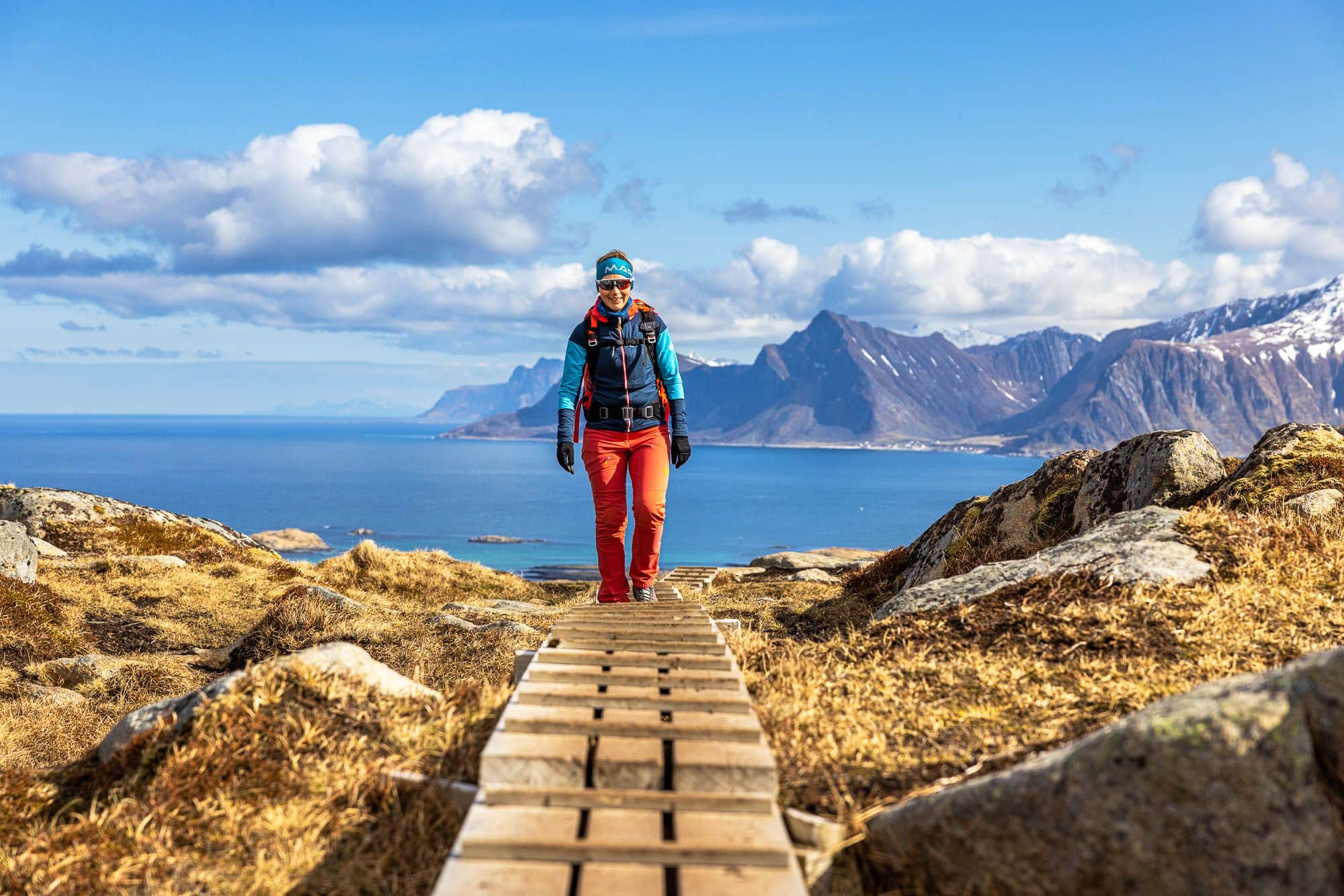
Almost lonely - bucket list summit in the off-season
On this day in May, we make our way to Fredvang and decide to park at the farm at the end of the road. There's not much going on today, the weather is gray, a cold wind is blowing and we even have to expect rain. Not the dream day for a dream mountain. But we made a conscious decision to visit Lofoten at this time of year, because where in summer there are masses of tourists, the parking lot is full of cars and there is a camper van parked in every free space, at the beginning of May there is still a yawning emptiness. Not even ten cars populate the parking lot, the owner, who collects the parking fee, is actually busy with renovation work for the upcoming season and with so few people around he even takes the time to talk to me. What interests me, of course, are the crowds that populate Lofoten in summer.
He tells me that around 50,000 visitors come here every year to make the excursion on Ryten. The hiking mountain is therefore high on the bucket list of many visitors to Lofoten. This is probably also due to the fact that the mountain is easy to reach, the ascent is moderate, the nature experiences are unique and the panorama is simply incredibly beautiful. The inhabitants of Fredvang and probably many other communities in Lofoten are divided in their opinion about tourists. There are those who simply ignore all the hype surrounding their islands and go about their own business. Then there are those, like himself, who profit from the great interest in Lofoten. After all, he earns his living by renting out parking spaces and "everyone needs money", he says with a smile on his face. But there are also those who would rather have everything the way it used to be, for whom the many people and the increasing infrastructure - be it larger roads, parking lots or accommodation - go against the grain. But there will probably never be a "back to zero" for the Lofoten Islands, it's just a question of dealing with the crowds and protecting this unique natural environment at the same time.
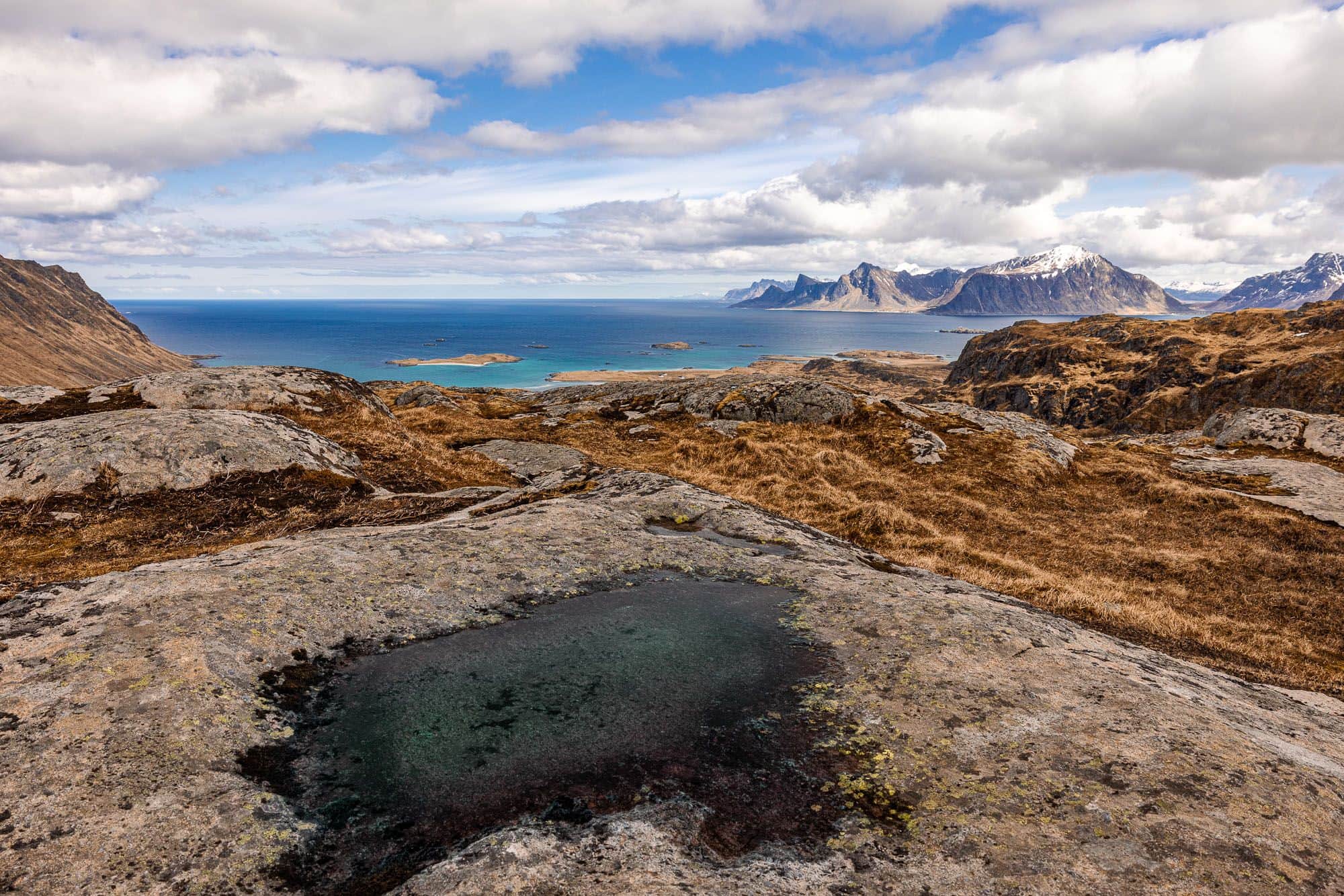
Too many visitors?
We shoulder our rucksacks and set off. As we cross the marshy terrain behind the farm on carefully laid wooden planks (with marked passing bays similar to those on the narrow roads) and reach the first ascent, our thoughts are already spinning. With tens of thousands of visitors every year, we ask ourselves when too much is simply too much. And despite the unique landscape in which we are walking, this tour makes us very thoughtful as we ascend. The path is trampled out over a width of several meters and wooden planks have been laid over long stretches in the swampy areas that we come across again and again as we progress, in order to protect the vegetation. If all 50,000 visitors were to walk through the muddy sections, the paths would only be more trampled out and there would soon not be much left of the valuable and protected vegetation.
Lofotodden National Park is located on the west coast of Lofoten and stretches from Å in the far south all the way up to Fredvang. In addition to Ryten, one of the most famous peaks in this national park, the legendary Kvalvika beach attracts many tourists. After the first 240 meters of elevation gain, we pass Forsvatnet and shortly afterwards we get our first glimpse of the world-famous Kvalvika beach. The view down to the turquoise water, the white, foaming waves and the rugged mountains that frame the scenery is indeed extremely impressive.
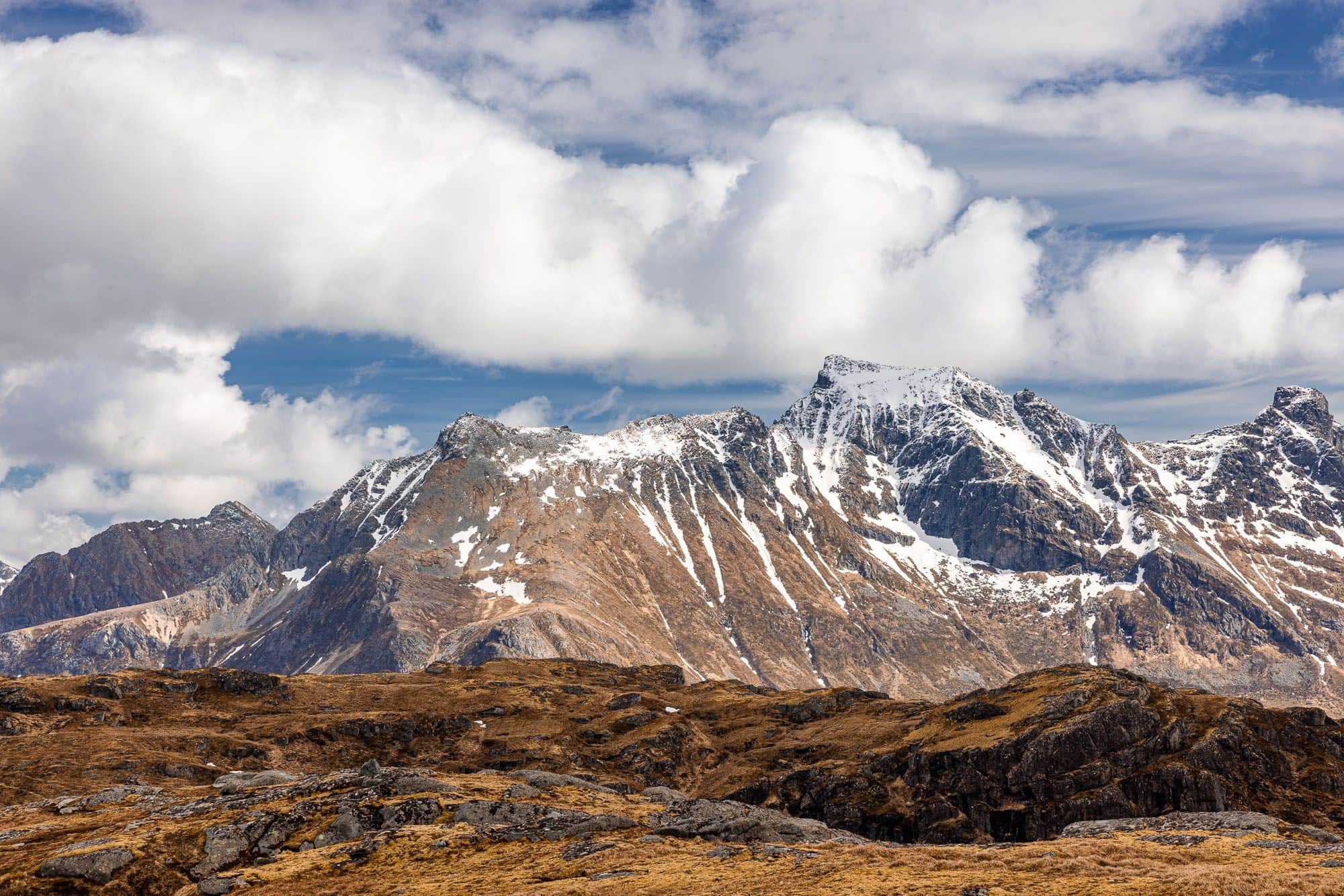
Everyone has a right to beautiful nature - but at what price?
There's not much going on at Ryten today, we meet about 20 to 30 other people during our entire hike and we can't see anyone on the beach itself. However, we don't want to imagine what goes on here in the summer months and doubt that the Norwegian Allemannsretten, i.e. the right of everyone to spend the night in nature, is a really good idea that can work sustainably in combination with mass tourism. Although we are in a national park at Ryten, the Norwegians rely on a high degree of individual responsibility rather than bans. In contrast to the often strict regulations in nature conservation areas or national parks in Germany or Switzerland, you are even allowed to stay overnight with your tent on Kvalvika beach. Does everyone really take their garbage back with them? Does everyone adhere to the current fire ban (April 15 - September 15) and does everyone who spends the night on the beach have their poop bag with them? 💩 Based on our experience, we dare to doubt it and with the mass of tourists, this will certainly have a noticeably negative effect on nature in the medium to long term.
The path then alternates between wooden planks and trodden paths and follows the western edge of Ryten towards the summit. At 540 meters, Ryten is not one of the giants among the mountains in Lofoten, but even here there is still a thick blanket of snow in some places. The Stokkvikdalen valley stretches out before us in a northerly direction, giving us the impression of completely untouched nature, as there is no path leading down there. Right next to it, Fuglhuken stretches upwards and next to us the long waves of the Atlantic roll onto the white Kvalvika beach. Towards the east, we can see the top of Volandstinden and across to Moltinden and Stortinden above Ramberg.

Summit bliss and natural beauty
It's windy up here, of course, and unfortunately the Ryten summit doesn't invite us to do more than a "quick snack" in windproof jackets and gloves. After a few minutes, we start our way back with cold hands in our pockets. Once again we walk along the edge of the cliff above Kvalvika beach and back to Forsvatnet.
The flora and fauna as well as the entire landscape in Lofotodden National Park is unique and worth protecting, and some of the habitats are on the red list. Extremely old plant populations (perhaps even the oldest in Norway) enrich the flora and many birds, such as white-tailed eagles and other endangered species, have their habitat in this ecosystem. What does not belong to this habitat, however, is man.
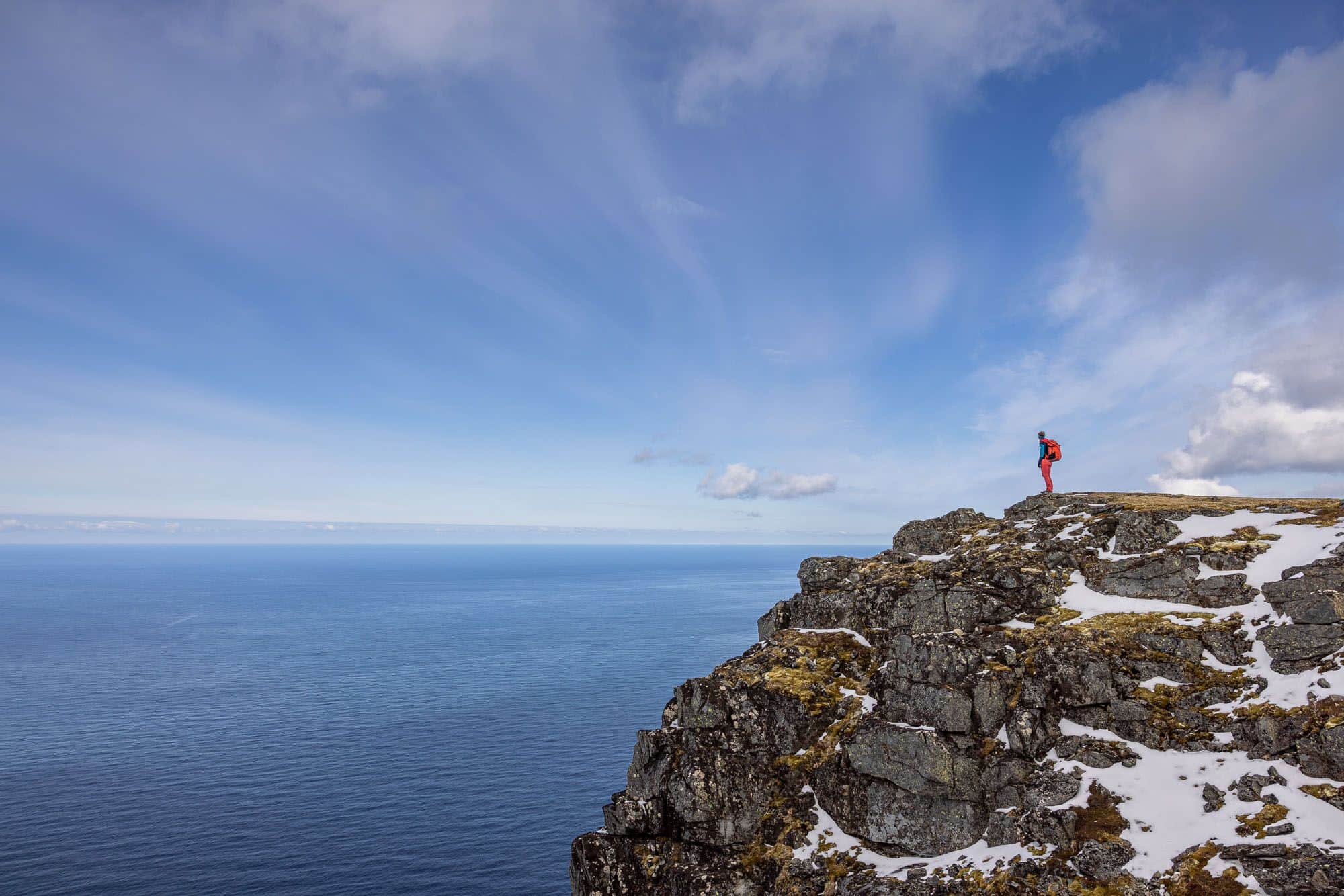
We are part of the problem
With every step down into the valley, we realize this once again on this hike. Step by step, plank by plank, we ponder and discuss the sense and nonsense of freedom and protection, and we ourselves don't know exactly how to deal with the development of mass tourism. The Lofoten Islands are so impressive that it is only understandable that so many people want to see them for themselves. To experience the Northern Lights or the midnight sun, see whales or enjoy snow-white beaches with turquoise waves. Personally, we try to avoid traveling to such places as much as possible during the high season, and yet we ourselves are part of the problem of mass tourism. So how do we deal with it?
We leave the last wooden footbridge behind us and cover the remaining meters to the farm where our van is parked on a narrow path. In the past three hours, we have seen and experienced a lot, had long discussions, kept quiet and thought a lot. We didn't find answers to any of our questions on Ryten, but once again we were certain that our attitude of following our intuition more often than any bucket list portals was exactly right. The hike on the Ryten is beautiful, there's no question about that. But there are many lonelier and no less impressive mountains in Lofoten that we personally like better.
Pure Spots.
Fine art prints from this location.